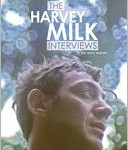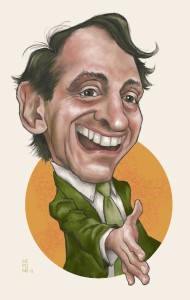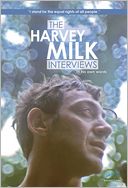 The Harvey Milk Interviews: In His Own Words
The Harvey Milk Interviews: In His Own Words
Edited by Vince Emery
Vince Emery Prods. 360 pages, $31.95
LIKE MANY gays and lesbians of my generation, I had the good fortune to come out at around the time that the magnificent documentary The Times of Harvey Milk was released. The 1984 feature won an Oscar as Best Documentary for its frank and brilliant recounting of the life and untimely death of the martyr to gay liberation. Also like many of my generation, I was frustrated by the continued lack of widespread knowledge of who Milk was, and what his legacy meant. That changed with Gus Van Sant’s Milk (2008), in which the Oscar-winning actor Sean Penn would take home a second Oscar for his vivid portrayal of the slain politician.
 That film helped to bring Milk closer to household-name status and undoubtedly smoothed the way for The Harvey Milk Interviews, an inviting collection of interviews with and speeches by Milk himself. As those who’ve seen the documentary know, Milk was—true to both gay and Jewish stereotypes—a huge talker. He espoused an opinion on every matter large and small, leaving no issue untouched. He ruminates on everything from potholes to the treatment of senior citizens to affirmative action. At one point, strangely enough, he even discusses the possibility of economic sanctions against Canada after the Toronto offices of the now-defunct gay magazine The Body Politic were raided by police, temporarily shutting down its publication.
That film helped to bring Milk closer to household-name status and undoubtedly smoothed the way for The Harvey Milk Interviews, an inviting collection of interviews with and speeches by Milk himself. As those who’ve seen the documentary know, Milk was—true to both gay and Jewish stereotypes—a huge talker. He espoused an opinion on every matter large and small, leaving no issue untouched. He ruminates on everything from potholes to the treatment of senior citizens to affirmative action. At one point, strangely enough, he even discusses the possibility of economic sanctions against Canada after the Toronto offices of the now-defunct gay magazine The Body Politic were raided by police, temporarily shutting down its publication.
Milk’s enthusiasm and exuberance were contagious. His sheer optimism and determination make for invigorating reading. He knew precisely what he was stepping into, and he was loving it: “The responsibility, as a gay liberationist, is incredible,” he told a community radio station shortly after being elected. “I knew it. I knew what I was getting into. I accepted it, and I feel I’ll be able to do it. I won’t be able to do as much as I would want. But you can be sure, I’ll be setting styles and tones that this city has never seen before.”
Milk’s astonishing—if entirely brief—political career was founded on a giant negotiation. On the one hand, he was an outspoken, unbending activist, driven to change the world and apparently allergic to hypocrisy. On the other hand, after taking office, he was forced to accept the reality of politics, which is compromise. What was striking about Milk was how he could sway public opinion through his media interviews and his winning personality. This fascinating book gives us more insight into just what a political genius Milk was. This activist-politician’s high-wire act was nicely summarized in his own words: “You can throw bricks at City Hall or you can take it over.” Like the leftist political figure portrayed by Warren Beatty in the 1998 film Bulworth, Milk always seemed to speak honestly from both the heart and the head, with an inspiring conviction that was somehow both passionate and level-headed. It’s agonizing to ponder what he could have achieved had he not been taken so soon.
It was this honesty that made Milk so refreshing. At a time when politicians seem willing to say anything in order to get into office, Milk’s remarks seem even more exceptional today. He would risk alienating a whole voting bloc if he truly felt he was advocating for the right thing. “Every time you take a stand you make an enemy,” he said, providing the book with the chapter heading, “But you also make a friend.”
Not lost here was Milk’s manic wit, a powerful weapon against his often humorless, dour enemies—his assassin Dan White among them—which is keenly reflected in this exhaustive anthology. Just when it seems editor Vince Emery has gone overboard, including the results of a small questionnaire that Milk filled out in 1974, a full reading indicates that the inclusion is worthwhile. When asked about additional vocations he had an interest in and affinity for, Milk wrote “Newspaper writter.” I laughed out loud at Milk’s intentional spelling error. Not that we needed much more proof that the man was great, but indeed he was—right down to the last syllable.
Matthew Hays is the author of The View From Here.






